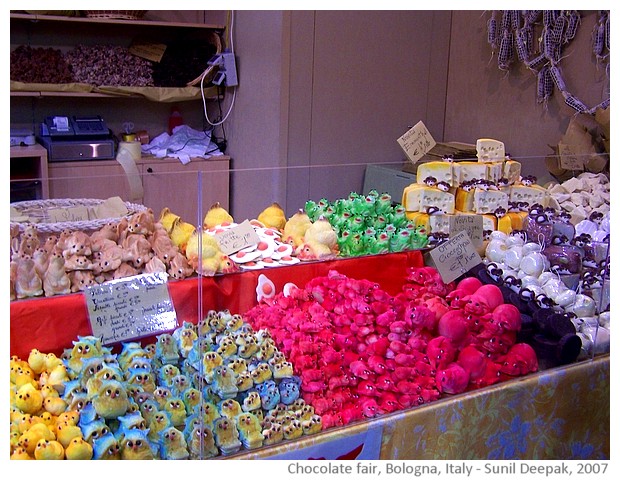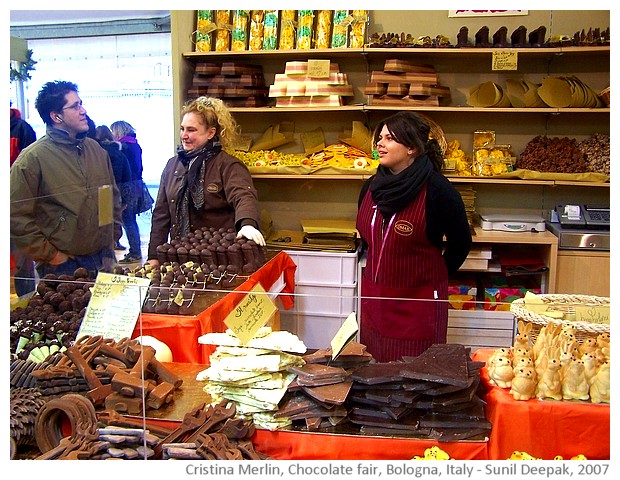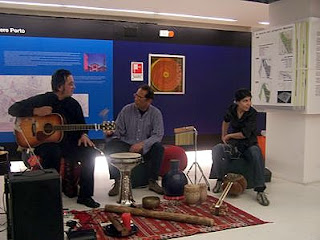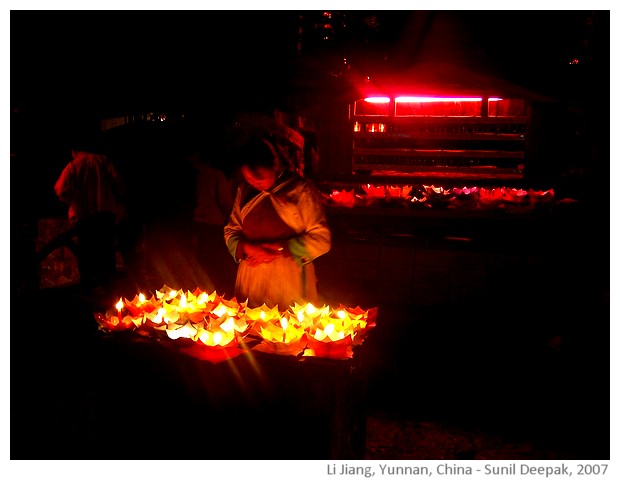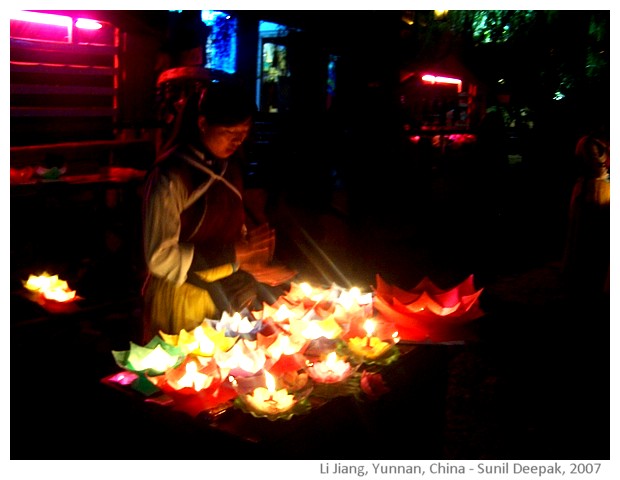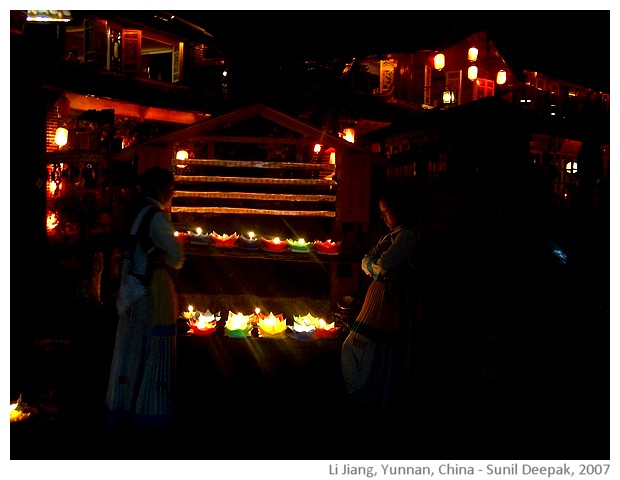Today I saw the new film of Ferzan Ozpetek. "Saturno contro". Means That "the saturn is in opposition". Like in the horoscopes. For a long time afterwards I was thinking about his films. I think that he is among the best Italian film directors today though I am not sure if his name or his films are known to English speakers? (In this picture Ferzan Ozpetek).
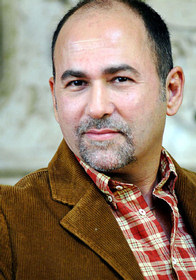
Ferzan was born in Istambul and came to Italy as a young student in late nineteen seventies. For fifteen years he worked as assistant to different directors including the wonderful Massimo Troisi. In 1997 he directed his first film, "Hammam, Bagno turco" (Hammam - the Turkish baths).
"Saturno Contro" that I saw today is his sixth film. I haven't seen all of them, I missed one of them, Harem Suaré that had come out in 1999.
Alternate sexuality is a common thread running through his films and sometimes, I have heard people dismiss him as the director of "gay films", but I feel that this would be reductive way to look at his work.
Alternate sexualities including gays, bisexuals, lesbians, transexuals, all find a place in his film world and are portrayed as real people, not as caricatures. Often he mixes the theme of alternate sexuality with other themes related to the marginalised persons such as the elderly and the urban poor.
Another common theme of his film is that of persons, especially women, who live lives cut off from their emotions and then something happens, that stimulates a radical transformation in the way they see the world and themselves.
Finally another common theme that I have noticed in his films is that of emotions linked to death, separation, loss and grief, and how we cope with these emotions, how they change us.
"Saturno Contro" starts with a group of friends. Most of them have crossed forty. David (Pierfrancesco Favino) is a writer who is gay, and his companion is Lorenzo (Luca Argentero). Their friends are Antonio (Stefano Accorsi), his wife Angelica (Margherita Buy), and Antonio's mistress Laura (Isabella Ferrari), a Turkish translator Neval (Serra Yilmaz) and her policeman husband Roberto (Filippo Timi), David's ex-boyfriend Sergio (Ennio Fantastichini), an astrolger and drug addict Roberta (Ambra Angiolini) and Paolo (Michelangelo Tommaso) a medical student and an aspiring writer, who wants to come close to David.
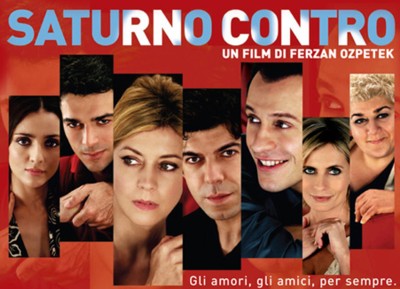
These friends meet regularly. Antonio and David are childhood friends but now it is Angelica who is closer to David and Lorenzo. Lorenzo discovers Antonio with his girl friend and does not what to do to protect Angelica, Antonio's wife, from this news. During a dinner at David's home, Antonio finds an excuse to go out to meet his girl friend. Then suddenly Lorenzo, who was not feeling too well loses consciousness, rushed to the hospital, he goes into coma. Suddenly their lives change and death enters the story.
Rest of the film is about Lorenzo's coma and then death in the hospital and how David and other friends react to it.
The film is an exploration of grief, when you suddenly lose the person you love and it seems that suddenly the world does not have any meaning. All the friends feel the grief of losing a friend but in their own way they all understand that the pain of David is strongest and yet do not know how to deal with it. It is a very moving film, slow and lingering over the details, of coming to terms with loss.
Le Fate Ignoranti (The Ignorant Angels) was another film of Ozpetek that came out in 2001 and became a popular and critical success. It was the story of an apparently happy and successful couple, Antonia and Massimo. Massimo suddenly dies in an accident and Antonia (Margherita Buy), a doctor is grief-stricken and shocked. Her whole life seems empty and meaningless.
One day among Massimo's office things Antonia finds a painting, behind it somebody has written, "From your angel". Suspicious that her husband had an affair, she tries to find out the person who had given that painting to Massimo. That is how she discovers that her husband had a relationship with a man, Michele (Stefano Accorsi) for the last seven years.
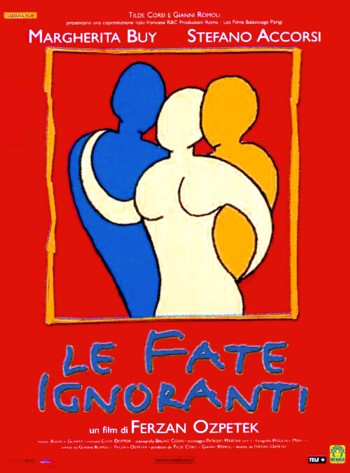
Initially shocked and repulsed she can't believe that her husband was betraying her to a man, but then she wants to understand and enters the world of Michele, a world where a group of gays, transexuals and lesbians live together as a community.
Michele says to her, "Don't be angry with me, you will be always his wife. Outside of this house I could never be anything for Massimo. I loved him for seven years and yet I can't even go and cry on his grave".
Antonia wants to understand that part of Massimo that she never even knew that existed. She feels attracted towards Michele but he is gay and not interested in her as a woman. Slowly Antonia understands that Michele is not the answer to her grief. Learning to cope with her grief, Antonia goes back to her own world.
In 2003, Ozpetek made La Finestra di Fronte (The window in front) about a woman Giovanna (Giovanna Mezzogiorno) with two children, living an unhappy life. Giovanna is attracted to a young man Lorenzo (Raoul Bova), who lives across the street near her house. One day she finds an elderly man who has lost his memory. Giovanna and Lorenzo try to discover about the past and family of the man, discovering that he was put in a concentration camp by Nazis because he was gay and his grief for his companion, whom he could not save from death.
In 2005, Ozpetek made his most spiritual film, Cuore Sacro (Sacred heart). It was the story of Irene (Borbora Bobulova), a successful and ruthless entrepreneur, who seems unperturbed by the suicide of her old friends because she has taken over their old company.

Ferzan was born in Istambul and came to Italy as a young student in late nineteen seventies. For fifteen years he worked as assistant to different directors including the wonderful Massimo Troisi. In 1997 he directed his first film, "Hammam, Bagno turco" (Hammam - the Turkish baths).
"Saturno Contro" that I saw today is his sixth film. I haven't seen all of them, I missed one of them, Harem Suaré that had come out in 1999.
Alternate sexuality is a common thread running through his films and sometimes, I have heard people dismiss him as the director of "gay films", but I feel that this would be reductive way to look at his work.
Alternate sexualities including gays, bisexuals, lesbians, transexuals, all find a place in his film world and are portrayed as real people, not as caricatures. Often he mixes the theme of alternate sexuality with other themes related to the marginalised persons such as the elderly and the urban poor.
Another common theme of his film is that of persons, especially women, who live lives cut off from their emotions and then something happens, that stimulates a radical transformation in the way they see the world and themselves.
Finally another common theme that I have noticed in his films is that of emotions linked to death, separation, loss and grief, and how we cope with these emotions, how they change us.
"Saturno Contro" starts with a group of friends. Most of them have crossed forty. David (Pierfrancesco Favino) is a writer who is gay, and his companion is Lorenzo (Luca Argentero). Their friends are Antonio (Stefano Accorsi), his wife Angelica (Margherita Buy), and Antonio's mistress Laura (Isabella Ferrari), a Turkish translator Neval (Serra Yilmaz) and her policeman husband Roberto (Filippo Timi), David's ex-boyfriend Sergio (Ennio Fantastichini), an astrolger and drug addict Roberta (Ambra Angiolini) and Paolo (Michelangelo Tommaso) a medical student and an aspiring writer, who wants to come close to David.

These friends meet regularly. Antonio and David are childhood friends but now it is Angelica who is closer to David and Lorenzo. Lorenzo discovers Antonio with his girl friend and does not what to do to protect Angelica, Antonio's wife, from this news. During a dinner at David's home, Antonio finds an excuse to go out to meet his girl friend. Then suddenly Lorenzo, who was not feeling too well loses consciousness, rushed to the hospital, he goes into coma. Suddenly their lives change and death enters the story.
Rest of the film is about Lorenzo's coma and then death in the hospital and how David and other friends react to it.
The film is an exploration of grief, when you suddenly lose the person you love and it seems that suddenly the world does not have any meaning. All the friends feel the grief of losing a friend but in their own way they all understand that the pain of David is strongest and yet do not know how to deal with it. It is a very moving film, slow and lingering over the details, of coming to terms with loss.
Le Fate Ignoranti (The Ignorant Angels) was another film of Ozpetek that came out in 2001 and became a popular and critical success. It was the story of an apparently happy and successful couple, Antonia and Massimo. Massimo suddenly dies in an accident and Antonia (Margherita Buy), a doctor is grief-stricken and shocked. Her whole life seems empty and meaningless.
One day among Massimo's office things Antonia finds a painting, behind it somebody has written, "From your angel". Suspicious that her husband had an affair, she tries to find out the person who had given that painting to Massimo. That is how she discovers that her husband had a relationship with a man, Michele (Stefano Accorsi) for the last seven years.

Initially shocked and repulsed she can't believe that her husband was betraying her to a man, but then she wants to understand and enters the world of Michele, a world where a group of gays, transexuals and lesbians live together as a community.
Michele says to her, "Don't be angry with me, you will be always his wife. Outside of this house I could never be anything for Massimo. I loved him for seven years and yet I can't even go and cry on his grave".
Antonia wants to understand that part of Massimo that she never even knew that existed. She feels attracted towards Michele but he is gay and not interested in her as a woman. Slowly Antonia understands that Michele is not the answer to her grief. Learning to cope with her grief, Antonia goes back to her own world.
In 2003, Ozpetek made La Finestra di Fronte (The window in front) about a woman Giovanna (Giovanna Mezzogiorno) with two children, living an unhappy life. Giovanna is attracted to a young man Lorenzo (Raoul Bova), who lives across the street near her house. One day she finds an elderly man who has lost his memory. Giovanna and Lorenzo try to discover about the past and family of the man, discovering that he was put in a concentration camp by Nazis because he was gay and his grief for his companion, whom he could not save from death.
In 2005, Ozpetek made his most spiritual film, Cuore Sacro (Sacred heart). It was the story of Irene (Borbora Bobulova), a successful and ruthless entrepreneur, who seems unperturbed by the suicide of her old friends because she has taken over their old company.
Then while planning to take over an old family home, she discovers the secret of her mother, who was apparently mentally ill and prisoner in that house. Her encounter with a thief young girl and the young girl's death bring her in contact with the reality of urban poor and her own guilt. Filled with remorse she gives up everything and in a gesture of penitence removes all her clothes in a metro-station.
If you have not seen any of Farzan's films, I hope that this brief description of his works will make you curious to see his films. I like his gentle way of story telling and his film worlds very much.
***
If you have not seen any of Farzan's films, I hope that this brief description of his works will make you curious to see his films. I like his gentle way of story telling and his film worlds very much.
***





